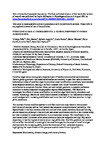CORALLINE ALGAE AT INCREASED CO2: A GLOBAL RESPONSE TO OCEAN ACIDIFICATION
| dc.contributor.author | Pena, V | |
| dc.contributor.author | Harvey, B | |
| dc.contributor.author | Agostini, S | |
| dc.contributor.author | Porzio, L | |
| dc.contributor.author | Milazzo, M | |
| dc.contributor.author | Horta, P | |
| dc.contributor.author | Le Gall, L | |
| dc.contributor.author | Hall-Spencer, Jason | |
| dc.date.accessioned | 2021-08-26T19:47:54Z | |
| dc.date.available | 2021-08-26T19:47:54Z | |
| dc.date.issued | 2021-07-01 | |
| dc.identifier.uri | http://hdl.handle.net/10026.1/17743 | |
| dc.description.abstract |
Coralline algae are an ecologically important part of benthic communities worldwide and there is growing concern that ocean acidification can severely impact their calcite skeletons. Laboratory studies of coralline algae in simulated ocean acidification conditions have revealed wide response variability, making it difficult to assess their future biodiversity and contribution to ecosystem function. Here, we used natural gradients in seawater carbonate chemistry in widely separated biogeographic regions (Mediterranean, NW Pacific) to investigate the effects of ocean acidification on coralline algal biodiversity, abundance and skeletal mineralogy. Molecular identification showed a decrease in the taxonomic diversity of coralline algae with increasing acidification and more than half of the taxa were lost in high pCO2 conditions. The success of some coralline species in acidified conditions may relate to their ancient evolutionary history as well as their present-day exposure to environmental variability. The Sporolithales is the most ancient order and evolved when ocean chemistry favoured low Mgcalcite deposition, although it has survived past ocean acidification events is less diverse today and was intolerant of ocean acidification in our molecular surveys. The Corallinales is the most recent order, it evolved when ocean chemistry favoured aragonite and high Mg-calcite deposition, it had the highest diversity at our high pCO2 sites. The CO2 gradients we surveyed did not affect the skeletal mineralogy of the coralline algae but the cover of coralline algae declined with the increasing pCO2, as did the thickness of their carbonate deposits, highlighting the lower fitness of this group as a whole under future high pCO2. | |
| dc.language.iso | en | |
| dc.subject | Biodiversity | |
| dc.subject | climate change | |
| dc.subject | evolutionary history | |
| dc.title | CORALLINE ALGAE AT INCREASED CO2: A GLOBAL RESPONSE TO OCEAN ACIDIFICATION | |
| dc.type | presentation | |
| plymouth.author-url | https://www.webofscience.com/api/gateway?GWVersion=2&SrcApp=PARTNER_APP&SrcAuth=LinksAMR&KeyUT=WOS:000682342700141&DestLinkType=FullRecord&DestApp=ALL_WOS&UsrCustomerID=11bb513d99f797142bcfeffcc58ea008 | |
| dc.identifier.doi | 10.1080/00318884.2021.1922050 | |
| plymouth.organisational-group | /Plymouth | |
| plymouth.organisational-group | /Plymouth/Faculty of Science and Engineering | |
| plymouth.organisational-group | /Plymouth/PRIMaRE Publications | |
| plymouth.organisational-group | /Plymouth/REF 2021 Researchers by UoA | |
| plymouth.organisational-group | /Plymouth/REF 2021 Researchers by UoA/UoA07 Earth Systems and Environmental Sciences | |
| plymouth.organisational-group | /Plymouth/Research Groups | |
| plymouth.organisational-group | /Plymouth/Research Groups/Marine Institute | |
| plymouth.organisational-group | /Plymouth/Users by role | |
| plymouth.organisational-group | /Plymouth/Users by role/Academics | |
| dc.publisher.place | 12th International Phycological Congress | |
| dc.rights.embargodate | 2023-7-20 | |
| dc.rights.embargoperiod | Not known | |
| rioxxterms.versionofrecord | 10.1080/00318884.2021.1922050 | |
| rioxxterms.licenseref.uri | http://www.rioxx.net/licenses/all-rights-reserved | |
| rioxxterms.type | Other |


